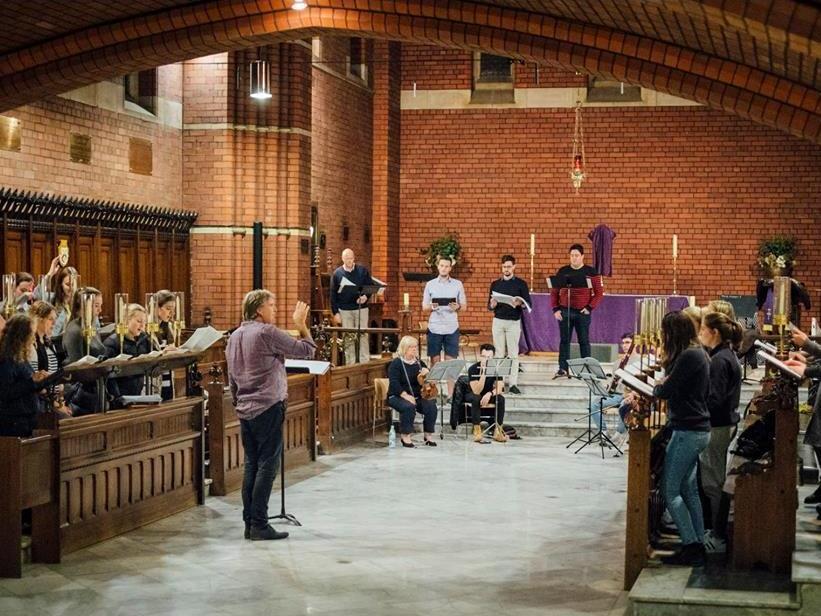The Song Company, Trinity College Choir, and the Evangelist Quartet. Photo by Georgia Ginnivan.
There is something enchanting and slightly surreal about sitting on the wooden pew in the hundred-year-old Horsfall Chapel of Trinity College at the University of Melbourne, aglow in the light of a stubbornly warm Autumn afternoon, listening to the choir swell to the bloodthirsty dictum: ‘Crucifige, crucifige eum!’ [Crucify him, crucify him!]. But this is the beginning of Holy Week, and it is tradition for the Gospels of the Passion, (covering Christ’s betrayal through to crucifixion), to be sung in Gregorian chant or ‘plainchant’, here accompanied by organ, oboe, bassoon, violin and cello. The choir is comprised of students of the College, and The Song Company, performing the parts of Christus, Pilatus, and the Evangelist Quartet, describes its members as ‘vocal adventurers and cultural ambassadors’, telling and re-telling new and ancient stories. Passio is a particularly modern reissue, and, in the confident, emotive hands of British conductor Antony Pitts feels mesmeric and significant.
Arvo Pärt was born in Estonia 1935, under Soviet occupation, and eventually settled in Berlin in 1980. Widely heralded as one of the most influential figures in 20th Century music, Pärt’s work is a heady cocktail of innovative, technical minimalism and tender, even earnest, spirituality. Both his Christian faith and his supposedly ‘Western’ orientations made him no great hit with the Soviet Union, but when his music was finally released to Western audiences they were struck by its emotional intensity and ‘timelessness’. Pärt’s technique of ‘tintinnabuli’ can even be read as metaphysical analogy: consisting of ‘one constantly-changing up-or-down movement heard against one constant ‘harmony’’, it has been compared to sunlight on the sea and other instance in the natural world where pattern and chaos is indiscernible only because of the myopia of the human condition – we cannot see the forest for the trees.
There is an exquisite delicateness to Passio, even when John O’Donnell’s organ booms from the gallery overhead to underscore the textured, fine-wine bass of Andrew O’Connor’s Jesus singing ‘Regnum meum non est de hoc mundo’, and whether or not one does believe, it seems His kingdom is truly not of this world. Pärt keeps the Latin in the Vulgate translation of the St John Passion, and rather than render the piece esoteric and inaccessible, breathes into it a majesty. With each word and each pause saturated with intent, unsurprisingly, Pärt is often requested as ‘deathbed’ music. Discord and angularity appear as the phrases move through their machinations offering solace without saccharinity, and an operatic ‘high camp’ aesthetic.
Even if you are not a fan of devotional music, or 75 minutes of Latin is not your cup of tea, this collaborative performance by Trinity College Choir and The Song Company demonstrates mature innovation, consummate musicianship, and the potential for exciting things to come from both companies.
4 ½ stars ★★★★☆Arvo Pärt: Passio
Presented by The Song Company in collaboration with Christopher Watson and the Choir of Trinity College
EVANGELIST QUARTET: Susannah Lawergren, Anna Fraser, Owen Elsley, and Lucien Fischer
VIOLIN: Elizabeth Sellars
OBOE: Jasper Ly
CELLO: Richard Vaudrey
BASSOON: Jye Todorov
PILATE: Christopher Watson
CHRISTUS: Andrew O’Connor
ORGAN: John O’Donnell
CONDUCTOR: Antony Pitts
12-13 April 2019
St Andrew’s, Brighton and Trinity College Chapel, Melbourne





